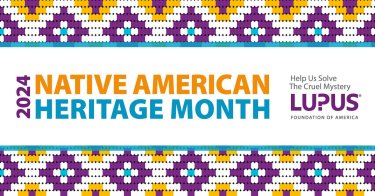Providing Answers, Support and Hope in Georgia
Honoring Native American Heritage Month: Advancing Lupus Awareness and Support in Tribal Communities

During Native American Heritage Month, we honor the resilience, culture and strength of American Indian and Alaska Native communities across the country. These communities have a rich history and deep connection to their heritage. At the Lupus Foundation of America (LFA), we’re committed to providing resources and tools that empower Native individuals with lupus – not only this month but all year round. By sharing stories, educational materials and guidance, we support Native communities in managing lupus and advocating for their health with confidence.
This year, we had the privilege of participating in the Oklahoma Community Health Representative (CHR) Educational Conference in Tulsa, Oklahoma. It is an essential event for health workers serving tribal communities, especially in rural areas. Community Health Representatives are trusted, invaluable links to healthcare within their communities. This conference allows them to connect, learn and bring back knowledge that directly impacts the community members they support. Conferences like these are critical for raising awareness about lupus and providing resources to those who may not have access to specialized healthcare. Through our participation, we aimed to empower CHRs with lupus education so they could share vital information in ways that resonate deeply with their communities.
In this blog, we’re sharing the experience of our team – Ashley Holden, Health Education Manager; Melissa French, Content Director; and Dr. Melicent Miller, Director of Federal Grants and Public Health Programs – at the conference. Each brought back valuable insights that will help us continue raising awareness and support Native communities impacted by lupus year-round.
Our Health Education Manager, Ashley Holden, represented the LFA at the conference. She led a presentation titled “Tools and Resources for Increasing Lupus Awareness in Your Community.” Her goal was to ensure that all attendees left with a foundational understanding of lupus, covering its types, symptoms, and complex journey to diagnosis.
Ashley introduced attendees to our Community Health Worker (CHW) Lupus Education and Resource Hub, an online tool offering on-demand learning modules, downloadable materials, and other resources to help CHRs become lupus experts within their communities. Many attendees shared that they had limited prior knowledge of lupus, though some had personal or family connections to the disease.
They were deeply appreciative of the resources provided and expressed eagerness to bring this newfound knowledge back to their communities and advocate for increased lupus awareness with their leadership. Ashley’s experience highlighted the unique role CHRs play as trusted figures who can educate and raise awareness in ways that resonate with their communities on a cultural level.
Our Director of Federal Grants and Public Health Programs, Dr. Melicent Miller, led a focus group of tribal community CHRs representing tribal nations in California, Montana, Oklahoma, and Washington as part of the PULSE Project. The purpose of the focus group was to gather feedback on resources provided by the LFA and understand the resource needs for people with lupus in tribal communities. Establishing connections and gathering feedback from CHRs was an important step to build connections with people with lupus in their communities, understand highly effective communication strategies, and gather feedback on newly designed LFA tools to increase their usefulness among tribal community members.
“The PULSE Project aims to reduce the average time to diagnosis and improve the coordination of care and quality of life of people living with lupus, especially among populations that are disproportionately impacted by the disease. This includes addressing barriers to accessing self-management tools and resources. Centering the experiences and voices of representative populations is essential to creating meaningful and effective resources. By listening to those who are closest to the challenges, we can ensure that our efforts are not only inclusive but also impactful in addressing the unique needs of diverse communities. Attending the Oklahoma CHR Conference has allowed us to engage in rich, meaningful dialogue with CHRs and foster what we hope to be long-lasting partnerships,” Melicent explained.
Our Content Director, Melissa French, was able to attend a focus group of tribal community CHRs that offered feedback on LFA education materials. The group also offered insight into the challenges that people in rural areas face in getting access to doctors and medications. This is particularly important for people with lupus who need specialist care and can need infusion medications.
“I am grateful that I had the opportunity to meet so many dedicated and knowledgeable professionals. I learned so much from the CHRs about their experiences and the people that they serve. I can take this knowledge and use it to develop tailored education materials that will fill in information gaps for people with lupus in tribal communities,” Melissa noted.
As we reflect on the impactful experiences of Ashley, Melissa, and Melicent at the Oklahoma CHR Educational Conference, we are reminded of the power of community and connection in raising awareness about lupus. Through collaboration with trusted health representatives and sharing vital resources, we can make strides toward improved understanding and support for those affected by lupus within Native American communities. This month and through the year, the Lupus Foundation of America remains committed to empowering Native communities with the knowledge and tools they need to make a difference. Together, we can ensure that everyone affected by lupus receives the care, understanding, and support they deserve.



